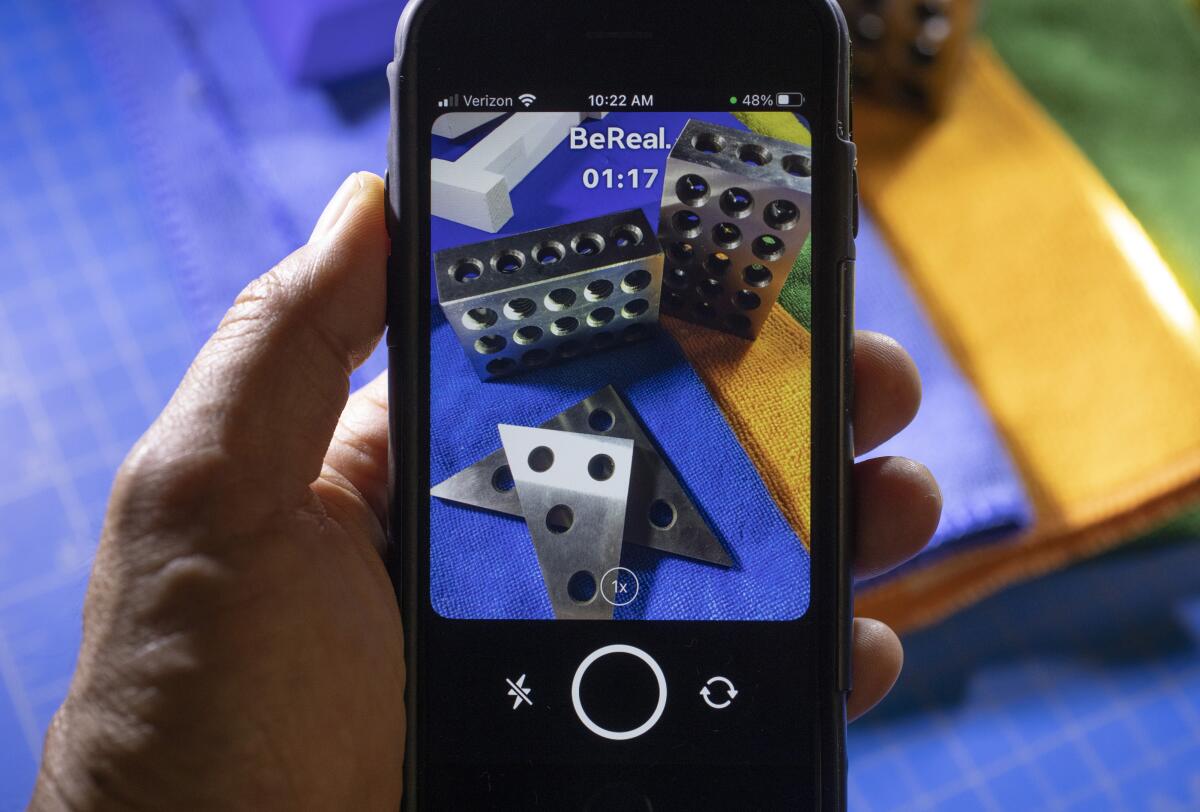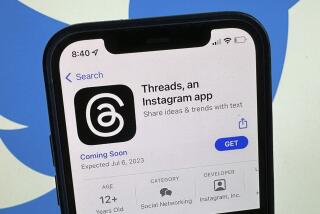BeReal, the anti-Instagram, tops the app charts despite crash problems

- Share via
BeReal, a social media app dubbed the anti-Instagram, has soared in popularity in recent weeks despite numerous complaints that it crashes at a critical moment.
The app, which requires all of the people on the platform to take a photo within a two-minute window each day, often glitches when everyone tries to upload their spontaneous pictures at once. Failure to upload your image within the designated timeframe leads to a “late” label of public shame.
Far from deterring users, however, the app took the top spot in the U.S. on Apple’s App Store for three days this week. It had 1.7 million installs during the week of July 11, the biggest weekly gain ever, according to digital analytics platform Sensor Tower.
It’s common, especially among social media companies, that when demand suddenly surges the infrastructure comes under strain, according to Arun Lakshmanan, an associate professor of marketing at the University at Buffalo School of Management. “The faster an application is able to ramp up, the more likely it is to become popular and stable,” he said.
BeReal’s boom echoes the early success of Instagram and Twitter, when platform glitches were frequent because of an overload of users. Those apps adapted and survived, but at a time when so many social media apps are competing for people’s attention, BeReal still has to prove it can be more than a passing fad.
The French app has been around since 2020, when it was founded by Alexis Barreyat and Romain Salzman. BeReal said it received $30 million in funding from Andreessen Horowitz, Accel Partners and New Wave, with participation from DST Global and others. Insider reported that BeReal is raising $85 million in fresh capital, led by DST Global, that would value the company at $600 million.
After gaining popularity in France, the app started taking off among college-age users in the U.S. earlier this year. Its appeal, according to many users, is its intentional opposition to the ultra-curated aesthetic of Instagram, which is owned by Facebook parent Meta Platforms.
On BeReal, people post only once daily, prompted by a push notification instructing them that it’s “Time to BeReal,” bracketed by two yellow warning sign emojis. With one click the app takes two photos, one from the front and back cameras simultaneously.
On TikTok and Instagram, pregnant women find themselves targeted with videos that prey on their worst fears as expectant mothers, from birth defects to child loss. For some, quitting social media is the only solution.
But for many people, this is where things go wrong. They might have to close and reboot the app multiple times, or if they are able to take a photo, it will take too long to upload, resulting in the dreaded “late“ label. Users can’t see what their friends post until they have posted themselves, so the glitches keep them from using the app.
During the first two weeks of July, there was a 254% increase in the number of negative reviews for BeReal for performance and bugs, according to data intelligence platform Apptopia. In May, reviews that cited “negative“ or “mixed” performance and “bugs” made up 56.4% of total reviews. BeReal declined to comment.
Despite the technical frustrations, people keep coming back for their daily post. BeReal users kept with the app at higher rates than the top 10 social apps, according to numbers from data.ai, a consumer and market data platform. For the month of May, the percentage of users who are still with the app after 7 days is almost 50% at BeReal, compared with 37% for other apps. After 30 days, those numbers level out at 35% and 34%.
One user, 19-year-old University of Michigan student Brianna Fox, who uses she/they pronouns, would try to take a picture but see instead their face toned purple and multiplied into a kaleidoscope-like grid, an effect their normal iPhone camera doesn’t have. When friends also got technical bugs, they joked that Fox passed it to them. Still, Fox continues to post daily.
“The only reason I would say I keep using it is it’s funny,” Fox said. “There are no filters like Instagram or Snapchat. It’s more candid, and I like that more.”
Omer Cayir, a 22-year-old law student in London, also posts to BeReal every day. He started using it in April, and after a couple of weeks saw glitches such as the caption or whole post deleting. For about a month, he didn’t get the notification that it was time to post. Cayir said it was frustrating, but he was happy to deal with it because he was still in the honeymoon phase with the app.
“There was a week or so where it felt a bit like a chore,” he said, “but the app luckily in the nick of time started to fix itself and started to get more exciting again.”
Not every user is enamored. Ben Boehlert, a 22-year-old research assistant in Cambridge, Mass., said half the time when he gets the “Time to BeReal” notification he doesn’t bother, and the other half he tries and fails to post. Many days he doesn’t see the notification because it’s in the middle of the workday.
“It’s made it kind of impossible to use,” he said, “which is unfortunate because it’s cool.“
Fox, Cayir and Boehlert all got on the app after friends persuaded them to join. Lakshmanan said when people talk to their friends about the app it creates a network effect that can help the app take off. But the platform needs to invest in becoming more usable so people’s behavior becomes ingrained, the professor said.
With the infusion of capital and “a little more investment” in the product and infrastructure, the glitches should get ironed out in time, Lakshmanan said. “Now, whether this will go the way of Facebook or Twitter, that’s an open question.”







